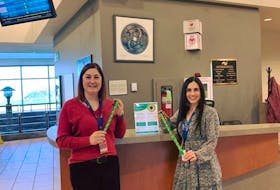It’s Sunday night in Toronto, and hundreds of people are settling down on a grassy hill at Christie Pits Park with blankets and pillows. Families are pulling out lawn chairs, younger couples are cuddling with their pets while older ones watch their kids take selfies before it gets too dark. A group of four friends, seated closer to the back, are about a quarter of the way through a picnic spread of crackers, cheese and an assortment of meats. Nearby, a card game is underway. But not for long. Tonight’s main event is about to begin.
Everyone is here to watch a movie.
In front of all of these people is a giant inflatable screen, and tonight, the crowd has gathered to watch Grey Gardens, the 1975 documentary by Albert and David Maysles. The film is presented as part of the Dynamic Duos programming at this year’s Christie Pits Film Festival, originally founded as a two-night event in 2011 by Emily Reid. Today, the film festival is the signature project of the Toronto Outdoor Picture Show, a local non-profit organization dedicated to outdoor film programming around the city of Toronto, co-founded by Reid and film buffs Felan Parker and Nikin Nagewadia.
Of course, watching movies outside is nothing new. Films have been screened outdoors since the beginning of cinema. And public screenings are popular around the world. In Australia, for instance, there’s an open-air film theatre that has been showing movies since 1916. In the late 1950s and early 1960s, North America went crazy for drive-in theatres.
However, by the time affordable home entertainment devices began hitting the market in the 1980s, people stopped going to drive-ins. Now, as more modern technology emerged, films have become even more accessible to private screenings. Almost any movie is available to be seen with the click of a button on our television screens or a tap on our smartphones.
See little kids and senior citizens all laughing and sharing something, it’s so unique
And yet, there seems to be a revival of sorts happening. Perhaps to counter balance the isolation we’ve unwittingly brought upon ourselves through technology, hundreds of outdoor movie events have begun to pop up across Canada. At a time when people are feeling increasingly fragmented, having events that bring communities together feels important. Almost everyone I talked to who is involved with screening movies outdoors began their journey not as a business opportunity, but rather a labour of love. Even as businesses have grown, the most rewarding aspects of operating outdoor movies remains the ability to bring people together.
Jason Bashnick, the owner of Fresh Air Cinema, a full service equipment rental company, quit his job in 2006, and has spent every summer since setting up outdoor screenings. Bashnick says he’s fallen in love with watching movies outside and that’s why he now hosts his own screenings at Stanley Park in Vancouver. Since working on open-air screenings full-time, crowd sizes for Bashnick’s events have ballooned from 50 people to more than 5,000 on a good night.
“The one thing about going to an outdoor movie is the social atmosphere,” Bashnick says. “When you go to a movie theatre, it’s dark, talking is discouraged. At an outdoor movie, it is very social. People are sitting on blankets next to each other and talking to each other. It’s encouraged and it’s a much different atmosphere. These are movies you can watch on Netflix or download for free on your computer. But it’s a combination of being outside, being in the fresh air, enjoying the summer and being able to watch a movie under the stars. There’s something magical about it when you hit all of those points.”
Isobel Walker grew up a movie buff and dreamed of hosting outdoor movie screenings for friends and family. When she was gifted an inflatable movie screen for Christmas over a decade ago, her dream became a reality. Her backyard became the go-to spot for friends and family to drop in to watch a film. Soon, she was setting up an outdoor movie screening in the parking lot of a donut shop. The pitch: free donuts and a movie. The first time the event was advertised, 500 people showed up.
We still view this as our living room and everyone from all walks of life, no matter their gender or race, are welcomed in our living room
Soon, Walker and her husband Mounir Khoury started Capital Pop-Up Cinema, billed as Ottawa’s only traveling movie theatre. Seven years later, business is thriving. Walker and Khoury partner with local businesses to hold screenings across the city. The screenings aren’t just a job to them, it’s a part of who they are. They’ve welcomed two kids into their family since they began running these events. Their one child was only a week old when they attended their first screening.
“It really feels like a community thing,” Walker says. “To look around and see little kids and senior citizens all laughing and sharing something, it’s so unique. To be able to do that for people and have the power to stamp something in their memory banks is really amazing and powerful.”
To leave these lasting memories requires a lot of planning and project management, especially when it comes to the programming. For Walker, the quintessential outdoor movie is The Princess Bride, the 1987 classic directed by Rob Reiner. The film has been screened every year at Walker’s events. Last year, over 1,800 people showed up to a screening. Some drove in from Kingston, Ont. Others arrived from Syracuse, N.Y. Because the audiences are so passionate about the film, Walker assures people sitting father away from the speakers that they’ll have no problem following the film because everyone will be reciting every line.
While Walker would like to use her events to share lesser-known films, balancing her curation dreams with actually drawing an audience can be tricky. Walker once organized a screening of Nosferatu, a 1922 silent horror film. She put a ton of time and effort into setting up the screening. Local artists were brought in provide a live music accompaniment for the film. A professor was invited to provide an opening lecture.
Then, only 12 people showed up.
“I would love to be able to show more challenging movies,” Walker says. “However, we know the audience won’t come. So we’ve found this perfect niche of early ‘80s to mid-to-late ‘90s movies. They’re movies that parents have already watched by themselves and want to watch with their children, or people who watched them as children and want to revisit it themselves.”
To ... have the power to stamp something in their memory banks is really amazing and powerful
Reid has developed a clever strategy for providing audiences with a taste of something different while still giving them what they demand. She pairs popular films with underappreciated classics and Canadian shorts. Last summer, Reid screened Casablanca, In The Mood For Love and Amelie as part of the festival’s Cinematic Cities series. This year’s program centred around a dynamic duos theme. Films include The Odd Couple, Infernal Affairs and on opening night, a screening of Rafiki, a Kenyan film about a lesbian romance in a country that has banned homosexuality. “It was our largest opening night of all time,” Reid says. “It had a diverse audience. It was one of our best nights this year.”
Wayne Carter is the executive director of the FIN Outdoor summer movie series in Halifax, where films are played at the historic Halifax Public Gardens. The goal of Carter’s programming is to keep things lighthearted and to introduce older films, like Back To The Future and The Goonies, to a younger generation. Often, Carter will see parents bringing their kids to his screenings. “It’s a cyclical thing,” Carter says. “We see a lot of people bringing their kids, and the conversation is, ‘I really loved this movie when I was young and I hope you enjoy it too.’”
Choosing the right film is just half the battle when it comes to organizing outdoor movie events, though. “We’re always watching the weather up until five o’clock on a movie night,” Carter says. Because Halifax has very short summers, there are rarely any make-up dates for rain. On nights when the weather does cooperate, crowd control can be a challenge as well. Outdoor screenings operate on a first-come, first-serve basis, which means cutting people off once a venue has reached capacity. “These screenings are free and people line up,” Carter says. “We have to be prepared to turn people away.”
The biggest logistical challenge is always the event itself. Reid learned the hard way about how difficult obtaining a park permit for public programming can be. Finding sponsorships and getting donations in order to keep these free events running can also be incredibly time-consuming.
It can all be overwhelming at times for organizers, but the experiences make itl worth it. Several years ago, Reid screened Rear Window, the Alfred Hitchcock classic. Even though Reid doesn’t cater her programming to be family-friendly, a mother brought her eight-year-old son to the screening that evening. He loved the film, and vowed to catch up on Hitchcock’s catalog of movies. “That’s what we want to foster,” Reid says, “a film-loving environment that is unpretentious but also interesting and challenging.”
Walker still remembers a Back to the Future screening held at Beechwood Cemetery a few years ago. Even though there were some technical glitches throughout (“We were told about a ghost in the mausoleum who likes to play with electricity,” Walker says, half-jokingly), the event left an impression on several people in the audience. “This mom was with her son,” Walker says. “And she told me, ‘This is my favourite movie. My son is 10, and this is the first time I’m sharing this film with him. Thank you so much, he will remember this forever.’”
Later, when she went home, Walker received an email from another audience member, who said her son and husband were both buried at the cemetery. Back to the Future was their favourite film, and she felt as though she got an opportunity to watch the film with them that evening.
The screenings that Walker is organizing now may be bigger, but she still has the same goals she had when friends would come to her backyard.
“We want to make sure we’re super inclusive and people feel welcomed,” Walker says. “We still view this as our living room and everyone from all walks of life, no matter their gender or race, are welcomed in our living room.”
Copyright Postmedia Network Inc., 2019









